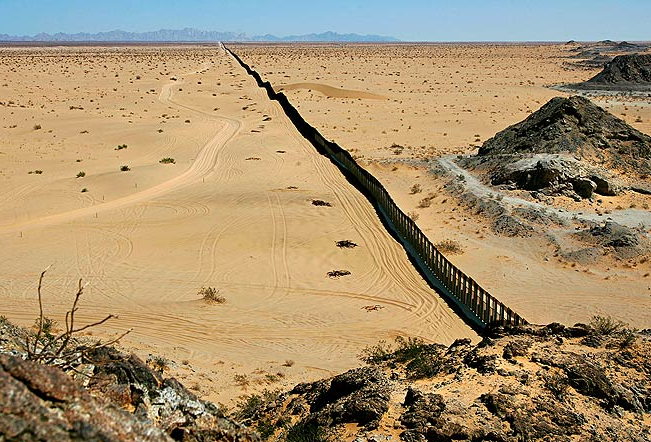I hated that I was required to memorize poems when I was in the 8th grade. But I had one of those truly inspirational teachers by the name of Abraham Elias, and when Mr. Elias said memorize poems … well, I memorized them. I never imagined that it would become an useful exercise. But then I encountered the above picture in an LA Times slide show titled “Building a Better Fence,” and the words came tumbling out, almost as if I couldn’t control them:
“Something there is that doesn’t love a wall,
That sends the frozen-ground-swell under it,
And spills the upper boulders in the sun,
And makes gaps even two can pass abreast.”
The photograph is of a portion of the 15–foot-high wall fence that stretches 40 miles east of San Luis, Arizona and separates the U.S. from the Mexican state of Sonora. In case you can’t tell, that is Sonora on the right side of the wall fence and San Luis, Arizona on the left. When completed the wall fence will start in San Diego and extend in fits and starts some 700 miles along the 2,000 mile U.S./Mexico border. Sometimes walls fences are designed to keep people in, like was the case with the Berlin Wall, but here the wall fence is designed to keep people out, protecting the U.S. from its neighbors to the south. In our post-cold war era this is what we call “homeland security.”
The need for serious immigration reform in the U.S is real, to be sure, but a 700 mile wall fence across a barren dessert valley in the name of national security is … well … insane. Indeed, upon first glance my initial thought was that the photograph above was actually an April Fool’s Day joke, but then I recalled that President Bush had signed an order to start such an enterprise and that the U.S. Congress had actually designated an initial 1.2 billion dollars (of what is expected ultimately to be a 6 billion dollar expenditure) to begin the task. But even still, I had to check to make sure I wasn’t reading The Onion.
The photograph marks the absurdity, if not the futility, of such an effort. The wall fence, which looks as much like a crack in the earth as anything, extends from an unidentified “here” to an infinitely distant and unknowable “there.” Its scope is thus hard to imagine, all the more so as we recall that the wall fence itself will only cover one-third of the border dividing the U.S. and Mexico. The viewer is located on the U.S. side looking across the wall fence line into Mexico, but of course we know this only because the caption tells us so since the two sides of the wall fence are equally barren and desolate, virtually and otherwise indistinguishable from one another. The arbitrary and political nature of the boundary between the two nation-states and of the location and exercise of power to enforce the separation is thus pronounced. And more, the very thought that such a physical boundary can be sustained for any extended period of time seems to be mocked by the natural landscape of the desert which promises to encompass and contain all that would disturb its contours.
It is difficult to see the poet’s “ground-swell” from this perspective, shot on-high and from a distance, nor are the two-abreast “gaps” that render such structures altogether ineffective apparent, but rest assured that they are there or will soon appear. For historically that has been the nature of walls and fences, whether in Berlin or Belfast or Jerusalem or Padua or elsewhere. What they are designed to keep out always finds its way in, and what is being contained always finds a way to leak or leech out. And for all of their failures such structures only fortify and reinforce the obsessive paranoia and fear of the alien that led to their being built in the first place, one more event in a cycle of state driven violence that keeps us from discovering more humane solutions to our problems.
The poet had it right, “Something there is that doesn’t love a wall.”
Photo Credit: Don Bartletti/LA Times; and the poet, of course, was Robert Frost, the poem, “Mending Wall.”

The death toll of the Berlin / East German Wall is, strictly speaking, unknown, but 700-odd is a likely figure. Or to put it another way, if that wall had not been there, 700-odd people would not have died. What do you suppose the mortal cost of this wall will be?
Michael,
The General Accounting Office released a report in 2006 titled “Border-Crossing Deaths have Doubled Since 1995.” http://www.gao.gov/new.items/d06770.pdf This is a direct result of border walls, because in many cases people try to go around them and end up in the desert instead of the city that was their goal.
[…] The Wall, more of your tax dollars at work. […]
[…] live in a country where at least one version of the cold war optic organized around the notion that walls of national separation and isolation might be a good thing persists— but that such a picture as […]
[…] written previously about my eight grade teacher, Abraham Elias, who taught me to memorize poetry when all I really […]
[…] design. You are looking at a section of the “fence”–otherwise known as a wall–that separates the US from Mexico. This massive construction project has been going on for […]
[…] I first wrote about this photograph two years ago I marveled at the utter insanity of thinking that we could actually establish a 700 […]